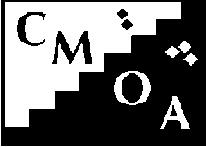
CAREER MEDICAL OFFICERS BULLETIN Volume 1 Number 1 December 1996
The inaugural meeting of the CMO association on the 13th November 1996 should be a landmark event for Career Medical Officers and will, in time, have importance for the wider medical community.
The group of twenty-eight doctors who met for a full day of discussion and decision-making came from diverse backgrounds; many came from emergency departments, however psychiatry, developmental disability, geriatrics, general practice, general surgery, intensive care and police forensic medicine were all represented. The fact that such a broad group was able to reach a consensus on the aims and objectives of our association, and with such good humour, speaks well for the future. I believe that this diversity is one of our strengths.
We have, by formulating our aims, begun a process of defining ourselves. The broad issues are more fully covered elsewhere in this newsletter, I would like to point out some of the more important features;
The Career Medical Officer role is a legitimate and viable career option.
Career Medical Officers have provided outstanding and persistent support to the health care of Australians, usually in busy service roles that other medical groups have been unable or unwilling to fill. They are now asking for educational opportunities and for recognition for the work that they perform.
Flexibility and independence have been the hallmark of this career structure and they need to be maintained in any programs that are instituted.
CMOs themselves must be involved in all discussions involving their role, education, accreditation or working conditions.
All medical practitioners who want to work in this role and who have completed at least two years post-graduate training are eligible.
These are clearly important matters. Medicine and medical career structures are changing rapidly - the fact that we, as CMOs, are increasingly necessary in the areas where we work is obvious. Many of these areas would be unable to function without dedicated CMO involvement.
There can be no doubt that this is a difficult time for health care generally and for doctors in particular, however the only way that we can influence the future direction of our own career structure is to become involved in the debate that is now going on - and joining the Association is one way of achieving this.
I was very pleased at the conference to see a representative from the Rural Doctors Resource Network at Newcastle (Dr Ian Cameron) stand up and give support to our Association - CMOs hold rural practitioners in high regard and close liaison with such a group would be most welcome.
The other pleasing feature was the support from both ASMOF and the AMA (in the persons of Duncan Invararity and Nolene Salmon). ASMOF, in its role as industrial representative to salaried medical officers, is aware of the whole context of CMO issues and should provide valuable support over the coming years, and the AMA is to be congratulated on its leadership role in putting CMO career structure on the agenda. A major way in which it could help in the future is to educate the rest of the medical community in CMO matters.
The next matter I would like to address is that of the committee members. I had met only one of the members before the meeting (Michael King - Treasurer, I'd trust my bankcard to him!) however I was really most impressed with the professional way they all took on their responsibilities. There were immediate and practical measures to give some structure to the meeting, somewhat lacking from yours truly. Martin Werry (Vice-President), initially helped make order out of chaos followed by Mary Webber (Secretary) - who was shanghaied into the position but took it in her stride. Stephen Delprado (Education officer) has great enthusiasm and energy - he'll need it for this position! Murray Barrell (Industrial officer) already has many contacts and good ideas. Kien Coaxuan (Media and Publicity officer) is a cartoonist of great skill as well as having media skills and Jenny Virgona (Public officer) quiet and competent. The committee also has the support of Michael Boyd, Seeta Durvasula and Shaun Stevens - they will all be working long hours (unpaid) for the Association. If you can help in any way, don't hesitate to contact members of the committee. The education and industrial officers in particular will need your support and ideas over the next few months what exactly do you want in the way of educational programs? what sort of industrial package is suitable?
Finally, if the ideals of the CMO Association fit in with your own, join now and encourage others to do the same. 1997 will be a good year for CMOs - the Career of the future.
John Egan
The only way that we can influence the future direction of our own career
structure is to become involved in the debate.
 Return to Vol 1 No. 1 Contents Page
Return to Vol 1 No. 1 Contents Page
 Return to CMO Bulletin Menu
Return to CMO Bulletin Menu
 Return ASCMO (formerly CMOA) Home Page
Return ASCMO (formerly CMOA) Home Page